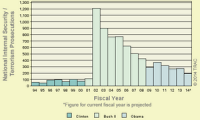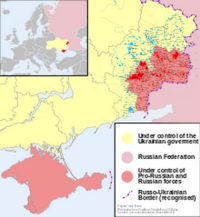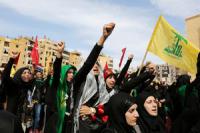-
Biolabs accidents, and genetic modification research
Exposures to infectious diseases in Bioafety level-3 (BSL-3) and BSL-4 environments can be scary, but they do happen. Concern has always extended beyond the safety of the laboratory worker, but also that a pathogen of pandemic potential could be released. Other aspects of lab safety have raised concern as well, as more attention has been directed toward gain-of-function (GoF) research.
-
-
U.S. Cyber Command cut Russian troll factory’s access to the internet

The U.S. Cyber Command blocked the internet access of the St. Petersburg’s-based Internet Research Agency (IRA), a Russian disinformation and propaganda outfit which was contracted by the Kremlin to orchestrate the social media disinformation campaign to help Donald Trump win the 2016 presidential election. The IRA’s access to the internet was blocked on midterms Election Day, and for a few days following the election.
-
-
Will terrorism continue to decline in 2019?

Lost in the headlines, rapidly accelerating news cycles and the pervasive fear generated by terrorist threats is the fact that terrorist attacks worldwide have actually been declining – in some areas substantially. From 2002 through 2014, worldwide terrorist attacks increased by 12 times and terrorist fatalities increased by more than eight times. But since 2014, the picture has changed dramatically – a development that has gone largely unreported in the media.
-
-
“Crimea must be returned to Ukraine,” U.S. tells Russia

The United States has reaffirmed that it will maintain sanctions on Russia until it returns control of Crimea to Ukraine, nearly five years after Moscow annexed the peninsula. U.S. Secretary of State Mike Pompeo said. “Crimea is Ukraine and must be returned to Ukraine’s control,” a U.S. State Department statement quoted Pompeo as saying.
-
-
Experts question BioWatch’s replacement
BioWatch, the program launched more than fifteen years ago to detect bioterrorism attacks in major American cities, has been routinely criticized for not living up to its early promise. Many have suggested doing away with the system all together. Trouble is, experts say that BioDetection 21 – DHS’s proposed replacement for BioWatch – is even less effective.
-
-
Report finds that Corbyn aide, Seumas Milne, has ties to Hamas
An explosive investigative report by a British newspaper has unearthed long-standing ties between Seumas Milne, a senior aide to the Labour Party’s leader Jeremy Corbyn, and terrorist organizations committed to the destruction of Israel. The investigation also revealed Milne’s extensive ties to organizations linked to the Kremlin. Sir Richard Dearlove, who led the Secret Intelligence Service MI6 from 1999 to 2004, said: “Anyone with his sort of background could not be let anywhere near classified information. It would be out of the question. That means Corbyn could not make the judgments and decisions a PM has to make unless he stopped consulting him.”
-
-
Telegram used by ISIS to spread propaganda globally
The Counter Extremism Project (CEP) this week reports about a Telegram channel that called for lone actor terrorist attacks in London, alongside other online websites that host ISIS videos and propaganda online. The encrypted messaging app is the platform of choice for terrorist group to call for violence.
-
-
Anti-Semitism in Venezuela: Maduro regime traffics in hateful conspiracies
As the political crisis continues in Venezuela, the hardline regime of Nicolas Maduro, whose power is currently being challenged, is promoting hateful anti-Semitic conspiracy theories and allegations of Jewish or “Zionist” plots to take over the government.
-
-
Why authoritarians love the concept of the Big Conspiracy
The idea of a Shadow World Government has always been very popular among conspiracy theorists. Its manifestations might be different, but generally the concept conjures up the image of a small group of men, deciding the fate of the world behind the scenes; puppet-masters, covertly controlling the world. Rulers of the rulers.
-
-
Better monitoring of nuclear power plants, nuclear proliferation
The United Kingdom is investing nearly £10 million (about $12.7 million) in a joint project with the United States to harness existing particle physics research techniques to remotely monitor nuclear reactors. Expected to be operational in 2024, the Advanced Instrumentation Testbed (AIT) project’s 6,500-ton detector will measure the harmless subatomic particles called antineutrinos that are emitted by an existing nuclear power plant 25 kilometers, or about 15.5 miles, away.
-
-
U.K. sets to add Hezbollah to terrorist groups list

The United Kingdom will join the United States, Canada, France, and the Arab League in banning all wings of Hezbollah because of its destabilizing influence in the Middle East. Since 2008 there has been a ban on U.K citizens joining the military wing of Hezbollah. The new ban will apply to the organization’s political wing as well.
-
-
Britain’s MI6 chief visited Israel to discuss Iran’s nuclear threat

The chief of Britain’s MI6 intelligence service recently visited Israel to discuss the threat posed by Iran’s nuclear program. Israeli intelligence believes that Iran is “making preparations” to develop nuclear weapons without blatantly violating the 2015 deal. However, the Islamic Republic has not yet made the political decision to break out, according to the Israeli assessment.
-
-
58 former national security officials challenge national emergency declaration
A group of 58 former senior U.S. national security officials will today (Monday) release a statement criticizing President Donald Trump’s for using, without factual justification, a national emergency declaration to fund a wall along the U.S.-Mexico border. “Under no plausible assessment of the evidence is there a national emergency today that entitles the president to tap into funds appropriated for other purposes to build a wall at the southern border,” the group of former senior officials said.
-
-
Deradicalization and countering violent extremism

Since the early 2000s, more than fifty countries have developed initiatives to counter violent extremism (CVE). Despite this, there still remains a lack of strong evidence on which interventions are effective. Researchers have reviewed the literature on CVE programs to give examples of what good CVE practice should look like.
-
-
It’s spy vs. spy vs. spy

“I think what we’re seeing unfolding on the news every day right now is, potentially, the greatest intelligence or espionage scandal in modern history, maybe in history, full stop. The Kremlin has managed to get a candidate who’s very favorable to itself in the White House. It is still slightly hypothetical, because we don’t know the results of the investigation, but the fact that [the FBI] started an investigation at all, and this question had to be asked at all, shows how weird and unprecedented this situation is. If the music stops right now and actually there’s nothing to it, still the fact that we had to ask this question, and it was investigated, is extraordinary,” says Calder Walton, Ernest May Fellow in History and Policy at Harvard Kennedy School (HKS) and editor of the forthcoming 3-volume The Cambridge History of Espionage and Intelligence.
-
More headlines
The long view
Factories First: Winning the Drone War Before It Starts
Wars are won by factories before they are won on the battlefield,Martin C. Feldmann writes, noting that the United States lacks the manufacturing depth for the coming drone age. Rectifying this situation “will take far more than procurement tweaks,” Feldmann writes. “It demands a national-level, wartime-scale industrial mobilization.”
No Nation Is an Island: The Dangers of Modern U.S. Isolationism
The resurgence of isolationist sentiment in American politics is understandable but misguided. While the desire to refocus on domestic renewal is justified, retreating from the world will not bring the security, prosperity, or sovereignty that its proponents promise. On the contrary, it invites instability, diminishes U.S. influence, and erodes the democratic order the U.S. helped forge.
Fragmented by Design: USAID’s Dismantling and the Future of American Foreign Aid
The Trump administration launched an aggressive restructuring of U.S. foreign aid, effectively dismantling the United States Agency for International Development (USAID). The humanitarian and geopolitical fallout of the demise of USAID includes shuttered clinics, destroyed food aid, and China’s growing influence in the global south. This new era of American soft power will determine how, and whether, the U.S. continues to lead in global development.
Water Wars: A Historic Agreement Between Mexico and US Is Ramping Up Border Tension
As climate change drives rising temperatures and changes in rainfall, Mexico and the US are in the middle of a conflict over water, putting an additional strain on their relationship. Partly due to constant droughts, Mexico has struggled to maintain its water deliveries for much of the last 25 years, deliveries to which it is obligated by a 1944 water-sharing agreement between the two countries.
How Disastrous Was the Trump-Putin Meeting?
In Alaska, Trump got played by Putin. Therefore, Steven Pifer writes, the European leaders and Zelensky have to “diplomatically offer suggestions to walk Trump back from a position that he does not appear to understand would be bad for Ukraine, bad for Europe, and bad for American interests. And they have to do so without setting off an explosion that could disrupt U.S.-Ukrainian and U.S.-European relations—all to the delight of Putin and the Kremlin.”
How Male Grievance Fuels Radicalization and Extremist Violence
Social extremism is evolving in reach and form. While traditional racial supremacy ideologies remain, contemporary movements are now often fueled by something more personal and emotionally resonant: male grievance.
